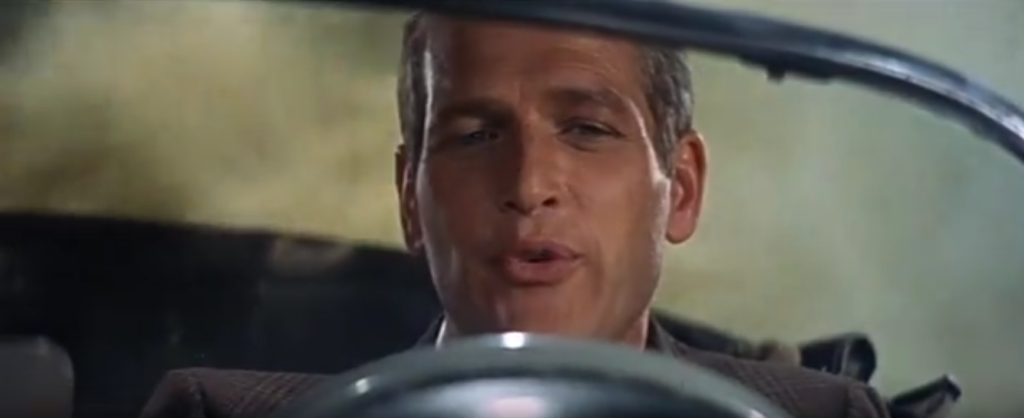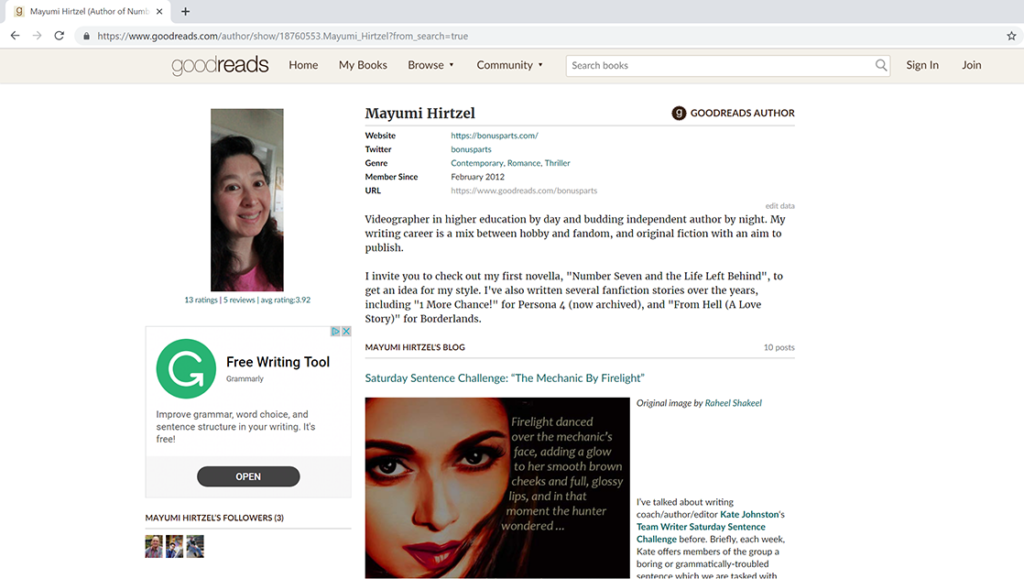by Mayumi-H | Nov 20, 2023 | Process, Writing Challenges
I’m still working on my occult detective story. A problem I ran into is that the original draft started with the protagonist (Isa) and did not present to the reader a body, as the genre is meant to do. I’m not averse to playing against genre rules in my fanfiction, but for a story I am interested in publishing someday soon, I figure I need to adhere more closely to what’s expected of me. My writer/editor friend Kate Johnston suggested a prologue.
I hashed this out in an afternoon. My hope is that it provides the reader with the body necessary to get this occult murder mystery adventure started. If you’re interested, take a look and let me know what you think?
(more…)

by Mayumi-H | Jul 21, 2023 | Process, Writing Challenges
Inspiration
For Round 2 of the July 2023 TeamWriter Writing Challenge, we had to write the first 250 words of a story based on a first line from Round 1. I chose to expand on this line: The house on Peachtree Avenue had a history of ghosts and strays. While I knew a ghost would have to come into it at some point, I needed a push for the rest. As is usual for me, an afternoon walk provided some inspiration.
Sex
My idea for two “strays” was a pair of young lovers. I wanted to write dialogue, but I also wanted to write a sex scene. (I have simple tastes.) I’ve been writing a space opera story that does have sex in it, but I’ve had a hankering to write something a bit more raunchy than what takes place there. I came up with some names – Kalle and Isa – and just started writing. With a sex scene in mind, the words flowed freely. It felt great. You can read those first 250 words here.
While those first 250 words to the story came easily, I got to the reveal too early. These young lovers never really got to the lovin’! So, I jumped into a longer telling, this one with more in-depth description. If you’re interested, you can read the first draft below. Now, this was before I outlined the overall plot, so this first draft has some elements that will probably change in a more complete writing. But it’s got some fun stuff, and I had a blast writing it. I hope you enjoy it, too. (more…)
by Mayumi-H | Dec 26, 2019 | It's My Life, Process
Writing Year in Review: 2019
Aside from publishing “Number Seven and the Life Left Behind,” my thriller novella, I didn’t achieve any writing milestones in 2019. On the other hand, I did write several thousand words in my sci-fi action novel, Riding Through the Dark. I started tearing apart Fearless, my romance novel, and sewing up a more thoughtful outline for it. I also hired an editor to do a developmental edit of my coming-of-age novella, “Finding Mister Wright”, and I started work on revisions there. But I don’t have anything concrete to show for those projects, yet.
Part of my difficulties with meeting goals this past year had to do with work and life interruptions. We can’t help those. One thing I discovered, though, was that my writing mindset increased whenever I got a little win. This usually came in the form of a reaction or comment to some kind of prompt. The tricky part of prompts is that they don’t always mesh with my stories or characters. So, I got to thinking: Why not control that by making my own prompts?
How to Prompt?
There are lots of different kinds of writing prompts: photos, phrases, key words, character traits. I don’t think I could name even most of them, let alone all! I know I need structure for my prompts, as well as variety. When considering which way I wanted to go, and taking into account my habits and style, I knew I couldn’t stick to just one format. Then I thought about time. The year has 52 weeks in it. The alphabet has 26 letters. Every two weeks, I could focus on one letter. That seemed easy, straightforward, and variable enough that I decided to go for it. Get ready for…
Writing in 2020: BonusParts from A to Z

I love writing stories. I also love talking about my stories. Nobody wants to listen, though, which is where this website comes in.
Every 2 weeks or so, I’m going to talk about my stories, from A to Z. The first post will be based on the prompt of “A”, and what “A” makes me think of when it comes to my stories. The next post, I’ll move on to the prompt “B”, and so on. I’m putting no restrictions on what I’ll write: It could be an article, a character sketch, a story excerpt, or some idea I haven’t come up with, yet. I’ll keep my focus to stories finished or already in progress. This is not the time to start completely new stories! I simply don’t have the time, haha.
My hope with this year-long challenge is that readers like you will learn something new about my stories and process, and maybe leave me some feedback. Even if I end up just shouting into the void, I think the more regular attention I’ll need to pay to my stories to keep these prompts going through the year will help me stay on-track with my larger writing endeavors.
What say you, friends and followers? Want to join me on my 26-week writing adventure? What are your writing goals for 2020?
by Mayumi-H | Sep 20, 2019 | Process
Beginnings and Woes
For many moons, I railed against the first-person point of view. That might have been influenced by Beverly Cleary, who used it to great effect in the children’s books that filled my youth. I associated first-person narrative with books directed at kids … and Victorian gothic tales, which are in many ways similar to children’s literature. (Don’t @ me. I specialized in Victorian Lit at university and I won’t be swayed in my opinion that those books are basically great, sweeping, gory morality tales. And I love them for that.)
When it came to what we’ll call popular modern adult fiction, though, my experiences with first-person POV were disappointing. What I read of it felt “shove-y”, like a teenager in desperate want of attention. Characters who wouldn’t shut up in their own heads, telling me what they were feeling all the damn time. In my own attention-grabbing behavior, I ended up throwing more than one book across the room because of it.
I realize now I was simply reading the wrong first-person POV books. Bad first-person POV books. Really, really bad ones.
The Turnaround
Around 2010, I became interested in detective stories. I’d always enjoyed police procedurals, and I’ve always wanted to write a detective story. The problem is, I’m not smart enough to come up with a crime to baffle a detective who’s reasonably good at their job. So, I started watching – and reading – the books on which some of my favorite TV detectives were based. At the time, that was Longmire and Inspector George Gently.
Craig Johnston (Longmire) and Alan Hunter (Inspector George Gently) are wonderful writers. It’s no wonder A&E (later Netflix) and BBC picked up their stories for televised popularization. Their writing is lively, witty, and, at its best, capable of lifting the reader out of their own self and into the lives of the characters on the page. And many of Hunter’s and all of Johnston’s stories are written in first-person! Due to my enjoyment of those series, I actively sought out other detective stories in the same vein. That’s when I discovered perhaps the greatest first-person crime novels of all time: Ross Macdonald and his weary but dogged private detective, Lew Archer.

It didn’t hurt that Lew was played onscreen in 2 films by the greatest actor of all time, Mr Paul Newman.
My life as a reader and as a writer has not been the same since.
Macdonald’s prose practically sings off the page into my head with every line. I’ve caught myself laughing aloud to Archer’s snappy repartee. Lew feels like a real man with real desires, hang-ups, and ambitions fulfilled and lost. The stories make me love being a reader, being able to enjoy a master – undisputed in my mind – working their craft. As a writer, the books inspire me to examine what I put down on my own pages, to write with clarity and purpose but never by sacrificing honesty and genuineness in the characters. I’ve found myself going back and re-reading all of the Lew Archer books multiple times, not just for the enjoyment factor but because each reading offers me new insight into craft, skill, and the characteristics of the first-person perspective.
The Future
When I read Ross Macdonald, I want to write as well as Ross Macdonald did. That’s not going to happen, but it’s a worthy goal. And every time I pick up my pen or open my laptop, I take that challenge to heart and try to put my best work forward. I’m even thinking of giving my own first-person noir a try.
What’s your take on first-person POV? Do you have a story that changed your mind one way or another? Let me know!
by Mayumi-H | Jul 26, 2019 | Process, Publishing
I’d had a Goodreads account for a while, but I hadn’t really used it. It felt like yet another social media commitment for which I have increasingly shrinking time. But a fellow writer and friend of mine – Christopher Mari (check out his books via the link) – recommended that I grab my own Author page at Goodreads. Apparently, it’s a good source for connecting with readers? And since I’ve got a published book under my belt, now, I figured it couldn’t hurt.
Here’s a screenshot of my Goodreads Author Pagemy Goodreads Author Page:

The long-form URL is https://www.goodreads.com/author/show/18760553.Mayumi_Hirtzel?from_search=true
As you can see from the screenshot, my Goodreads “blog” is simply an RSS/Atom feed from my blog here. So you don’t have to follow anything different to keep up with me and my writing adventures. But maybe someone will find their way from there over to here, and I’ll be able to welcome some new friends!
Are you an active Goodreads participant reader or writer? Let me know in the comments, and we can connect!
by Mayumi-H | Jan 23, 2019 | Other Stories, Process
World Building in Fan Fiction
I enjoyed the first Pacific Rim film. Watching it, I wanted to learn more about that world. For that, I did a little bit of reading and poking around the Internet (mainly the Wikipedia article). While that gave me a gleaning of information, I wanted to do something a little bit more.
I didn’t always like world building. It seemed tedious. But as I’ve started to create my own worlds, I’ve come to appreciate the craft of others’ worlds. It’s just that some worlds lack the specific piece I’m looking for, which is why I write fan fiction.
In the first Pacific Rim movie, I loved the design of Cherno Alpha, the Russian robotic monster-hunter Jaeger. Cherno’s pilots had a great fight scene but were handed a raw deal in the script (along with the Wei triplets and their Crimson Typhoon Jaeger, which had to be one of the coolest ideas for a robot ever). I was in the shower one morning when I got the main ideas for the Kluge twins, competitive brothers caught in the swirl of war with the Kaiju but somehow still distanced from it…until it becomes personal to one of them.
I wrote a drabble based on this personal connection (“Worth Dying For”), but here’s the backstory for the brothers, written in a world-building buzz of one sitting almost 5 years ago…
The Brothers Kluge
Ein and Albert Kluge are fraternal twins from Ulm, a city in Baden-Württemberg in Germany, born September 23, 2000, to parents Inge and Erhard Kluge, a chief engineer at Zwick Roell Group. Brash and competitive, especially with each other, the twin boys grew to adulthood in the far-reaching shadow of Kaiju attacks, each one always trying to one-up his brother for skills and smarts. Their father desired them to stay in Germany and continue their work with him at Zwick, but when they came of age, they enrolled in the Pan Pacific Defense Corps Jaeger Academy. They believed their close genetic bond would make them excellent candidates for the Ranger pilot program (q.v., Gage twins, Wei triplets). However, while their mental and physical scores were significant, they failed out in first cut, being particularly incapable of successful Drifting with one another or anyone else.
Morally winded, the Kluge twins resigned themselves to returning to Germany and their “disappointingly conventional” heritage as material testers like their father. Before they were dismissed from Kodiak Island, though, first-generation Ranger and instructor Stacker Pentecost suggested that, while their competitive nature with each other would prove disastrous in a Conn-Pod, it could be highly beneficial in a research capacity:
“It’s not all about piloting Jaegers, you know,” Pentecost said. “J-Tech Engineering needs checks and balances, too.”
Ein looked at his younger brother. Albert looked back at him with the gleam of a new grin. They turned to Pentecost at the same time, and at the same time said, “When do we start?”
Having agreed to training and assignment at the Vladivostok Shatterdome, the Kluge twins soon became Jaeger Engineers. They contributed to upgrades in design and armor on Jaegers Nova Hyperion and Cherno Alpha. During their assignment at Vladivostok, Ein developed one-sided and mostly-hidden romantic feelings for Ranger Sasha Kaidanovsky, one of the pilots of Cherno Alpha. Albert advised his brother to steer clear of both Sasha and her husband Aleksis, but Ein remained devoted:
“You’re a fool if you think you have any chance with Frau Kaidonovsky,” Albert said, snorting under his breath.
Ein wilted. “I know she will never be mine. But I cannot ignore that which beats in my heart. So I will do everything in my power to help her. With or without you, Brüderchen.”
When the Vladivostok Shatterdome was closed in 2024, Cherno Alpha and her J-Tech team, including the Kluge twins, were relocated to Hong Kong. On 8 January 2025, Hermann Gottlieb’s predicted Double Event occurred. Kaiju Leatherback and Otachi attacked, destroying the Jaegers Crimson Typhoon and Cherno Alpha.
On hearing the news of the Kaidanovskys’ deaths, Ein Kluge was never the same. Neither was his brother Albert.





Recent Comments
The Real Person!
Author Mayumi-H acts as a real person and passed all tests against spambots. Anti-Spam by CleanTalk.
The Real Person!
Author Mayumi-H acts as a real person and passed all tests against spambots. Anti-Spam by CleanTalk.